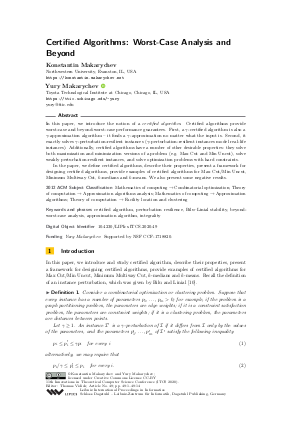Certified Algorithms: Worst-Case Analysis and Beyond
Authors
Konstantin Makarychev,
Yury Makarychev 
-
Part of:
Volume:
11th Innovations in Theoretical Computer Science Conference (ITCS 2020)
Part of: Series: Leibniz International Proceedings in Informatics (LIPIcs)
Part of: Conference: Innovations in Theoretical Computer Science Conference (ITCS) - License:
 Creative Commons Attribution 3.0 Unported license
Creative Commons Attribution 3.0 Unported license
- Publication Date: 2020-01-06
File

PDF
LIPIcs.ITCS.2020.49.pdf
- Filesize: 488 kB
- 14 pages
Document Identifiers
Subject Classification
ACM Subject Classification
- Mathematics of computing → Combinatorial optimization
- Theory of computation → Approximation algorithms analysis
- Mathematics of computing → Approximation algorithms
- Theory of computation → Facility location and clustering
Keywords
- certified algorithm
- perturbation resilience
- Bilu
- Linial stability
- beyond-worst-case analysis
- approximation algorithm
- integrality
Metrics
- Access Statistics
-
Total Accesses (updated on a weekly basis)
0PDF Downloads0Metadata Views
Abstract
In this paper, we introduce the notion of a certified algorithm. Certified algorithms provide worst-case and beyond-worst-case performance guarantees. First, a γ-certified algorithm is also a γ-approximation algorithm - it finds a γ-approximation no matter what the input is. Second, it exactly solves γ-perturbation-resilient instances (γ-perturbation-resilient instances model real-life instances). Additionally, certified algorithms have a number of other desirable properties: they solve both maximization and minimization versions of a problem (e.g. Max Cut and Min Uncut), solve weakly perturbation-resilient instances, and solve optimization problems with hard constraints. In the paper, we define certified algorithms, describe their properties, present a framework for designing certified algorithms, provide examples of certified algorithms for Max Cut/Min Uncut, Minimum Multiway Cut, k-medians and k-means. We also present some negative results.
Cite As Get BibTex
Konstantin Makarychev and Yury Makarychev. Certified Algorithms: Worst-Case Analysis and Beyond. In 11th Innovations in Theoretical Computer Science Conference (ITCS 2020). Leibniz International Proceedings in Informatics (LIPIcs), Volume 151, pp. 49:1-49:14, Schloss Dagstuhl – Leibniz-Zentrum für Informatik (2020)
https://doi.org/10.4230/LIPIcs.ITCS.2020.49
BibTex
@InProceedings{makarychev_et_al:LIPIcs.ITCS.2020.49,
author = {Makarychev, Konstantin and Makarychev, Yury},
title = {{Certified Algorithms: Worst-Case Analysis and Beyond}},
booktitle = {11th Innovations in Theoretical Computer Science Conference (ITCS 2020)},
pages = {49:1--49:14},
series = {Leibniz International Proceedings in Informatics (LIPIcs)},
ISBN = {978-3-95977-134-4},
ISSN = {1868-8969},
year = {2020},
volume = {151},
editor = {Vidick, Thomas},
publisher = {Schloss Dagstuhl -- Leibniz-Zentrum f{\"u}r Informatik},
address = {Dagstuhl, Germany},
URL = {https://drops.dagstuhl.de/entities/document/10.4230/LIPIcs.ITCS.2020.49},
URN = {urn:nbn:de:0030-drops-117347},
doi = {10.4230/LIPIcs.ITCS.2020.49},
annote = {Keywords: certified algorithm, perturbation resilience, Bilu, Linial stability, beyond-worst-case analysis, approximation algorithm, integrality}
}
Author Details
Funding
- Makarychev, Yury: Supported by NSF CCF-1718820.
References
-
Amit Agarwal, Moses Charikar, Konstantin Makarychev, and Yury Makarychev. O(√log n) approximation algorithms for Min UnCut, Min 2CNF Deletion, and directed cut problems. In Proceedings of the Symposium on Theory of Computing, pages 573-581, 2005.

-
Haris Angelidakis, Pranjal Awasthi, Avrim Blum, Vaggos Chatziafratis, and Chen Dan. Bilu-Linial stability, certified algorithms and the Independent Set problem. In Proceedings of the European Symposium on Algorithms, 2019.

-
Haris Angelidakis, Konstantin Makarychev, and Yury Makarychev. Algorithms for stable and perturbation-resilient problems. In Proceedings of the Symposium on Theory of Computing, pages 438-451, 2017.

-
Sanjeev Arora, James Lee, and Assaf Naor. Euclidean distortion and the sparsest cut. Journal of the American Mathematical Society, 21(1):1-21, 2008.

-
Vijay Arya, Naveen Garg, Rohit Khandekar, Adam Meyerson, Kamesh Munagala, and Vinayaka Pandit. Local search heuristics for k-median and facility location problems. SIAM Journal on computing, 33(3):544-562, 2004.

-
Pranjal Awasthi, Avrim Blum, and Or Sheffet. Center-based clustering under perturbation stability. Information Processing Letters, 112(1-2):49-54, 2012.

-
Maria-Florina Balcan, Nika Haghtalab, and Colin White. k-Center Clustering Under Perturbation Resilience. In International Colloquium on Automata, Languages, and Programming, 2016.

- Maria-Florina Balcan and Colin White. Clustering under local stability: Bridging the gap between worst-case and beyond worst-case analysis. arXiv preprint, 2017. URL: http://arxiv.org/abs/1705.07157.
-
Yonatan Bilu, Amit Daniely, Nati Linial, and Michael Saks. On the practically interesting instances of MAXCUT. In International Symposium on Theoretical Aspects of Computer Science, 2013.

-
Yonatan Bilu and Nathan Linial. Are Stable Instances Easy? In Innovations in Computer Science, pages 332-341, 2010.

-
Vincent Cohen-Addad and Chris Schwiegelshohn. On the local structure of stable clustering instances. In Proceedings of the Symposium on Foundations of Computer Science, pages 49-60, 2017.

-
Zachary Friggstad, Kamyar Khodamoradi, and Mohammad R. Salavatipour. Exact Algorithms and Lower Bounds for Stable Instances of Euclidean K-means. In Proceedings of the Symposium on Discrete Algorithms, pages 2958-2972, 2019.

- Anupam Gupta and Kanat Tangwongsan. Simpler analyses of local search algorithms for facility location. arXiv preprint, 2008. URL: http://arxiv.org/abs/0809.2554.
-
Shi Li and Ola Svensson. Approximating k-median via pseudo-approximation. SIAM Journal on Computing, 45(2):530-547, 2016.

-
Konstantin Makarychev and Yury Makarychev. Bilu-Linial Stability. In T. Hazan, G. Papandreou, and D. Tarlow, editors, Perturbations, Optimization, and Statistics, chapter 13. MIT Press, 2016.

-
Konstantin Makarychev, Yury Makarychev, and Aravindan Vijayaraghavan. Bilu-Linial stable instances of Max Cut and Minimum Multiway Cut. In Proceedings of the Symposium on Discrete Algorithms, pages 890-906, 2014.

-
Ankit Sharma and Jan Vondrák. Multiway Cut, Pairwise Realizable Distributions, and Descending Thresholds. In Proceedings of the Symposium on Theory of Computing, 2014.

-
Daniel A Spielman and Shang-Hua Teng. Smoothed analysis of algorithms: Why the simplex algorithm usually takes polynomial time. Journal of the ACM (JACM), 51(3):385-463, 2004.

-
David Zuckerman. Linear Degree Extractors and the Inapproximability of Max Clique and Chromatic Number. In Proceedings of the Symposium on Theory of Computing, 2006.

